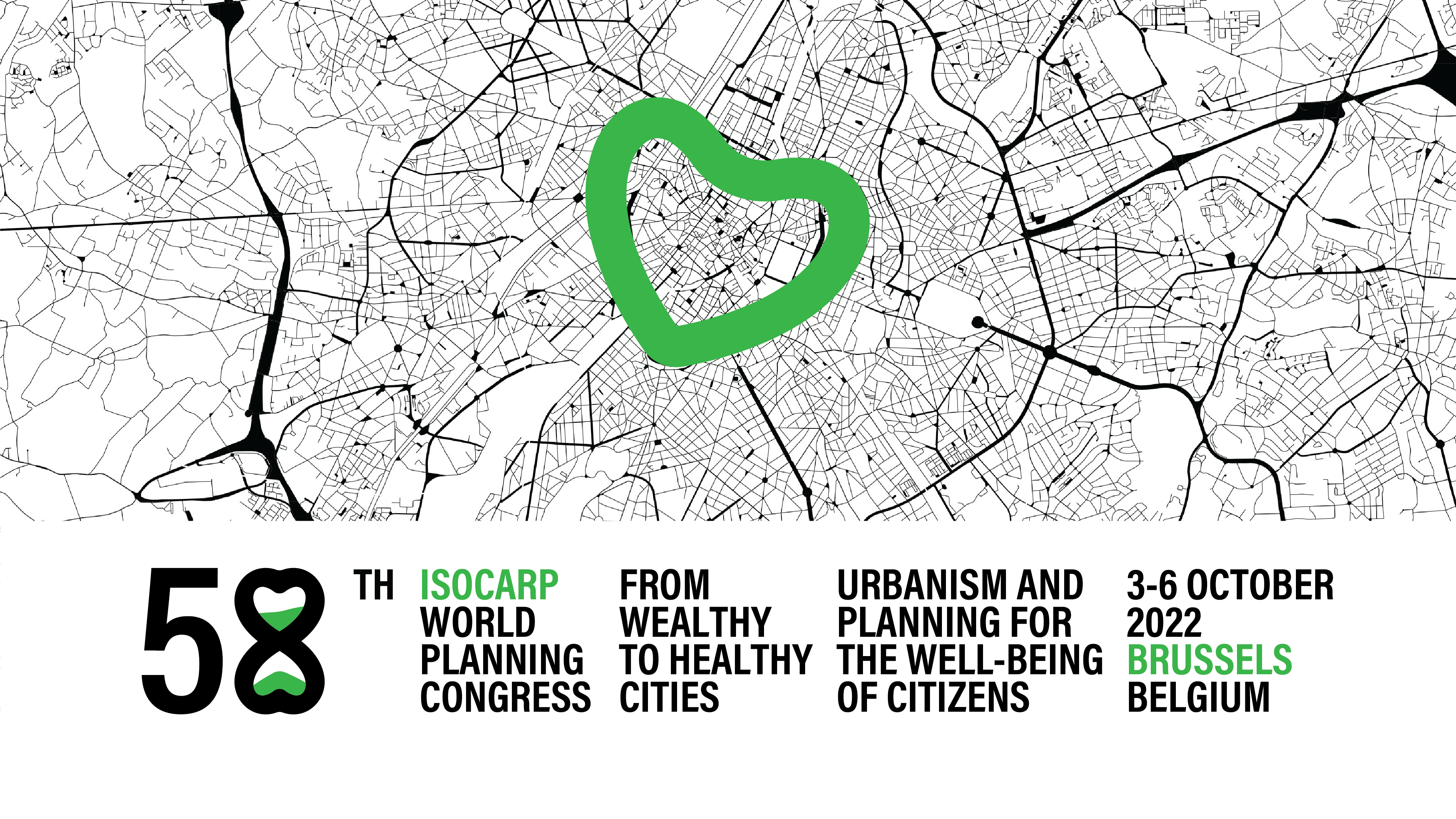
JOIN US AT THE 58TH ISOCARP WORLD PLANNING CONGRESS “FROM WEALTHY TO HEALTHY CITIES”, HOSTED BY BRUSSELS CAPITAL REGION ON 3-6 OCTOBER 2022, IN BRUSSELS
We have been going through turbulent times, exacerbated by the Covid19 pandemic, which urged us to rethink how we build our cities. Planners, urban designers, architects, policy makers, politicians from all around the world have been thinking, planning, designing, and experimenting with new ideas and reinventing not so new ideas. As the General Rapporteur, I welcome you to the 58th ISOCARP World Planning Congress in Brussels, which will be an important platform to explore and discuss the pathways towards a future we need ‘From Wealthy to Healthy Cities.’
With this congress-theme, the International Society of City and Regional Planners (ISOCARP) and the Brussels Capital Region aim to highlight the need for building another world, a world where collective wellbeing reigns and no one is left behind. It is essentially a quest for an economy that prioritizes people, places, and the planet and moves beyond profit and growth to prioritizing social and ecological wellbeing.
The multitude of interrelated crises induced by longstanding growth-oriented thinking brought humanity to the verge of a planetary socio-ecological collapse. Thus, there is an urgent need to search for alternative ways of organizing socio-economic relations beyond the ruthless principles of pro-growth economic policies. It is, therefore, time to redefine our notion of progress and foster a paradigm shift towards an economy that observes planetary boundaries and decolonizes nature. Such an economy necessitates decarbonizing cities and city-regions, circularity and de-growth.
With its new ‘Shifting Economy’ strategy, the Brussels Capital Region provide a perfect context for new pathways towards a transition to an economy that responds to the ecological impasse and the multifaceted social and economic challenges of our times.
Transition to a healthy economy urges us to rethink how we produce, consume and live. We will explore how to transcend conventional measures of economic success defined by GDP and provide a fair distribution of wealth and well-being in the society. Everyone, regardless of their background, has the right to a decent standard of living, to a decent job and employment security. Hence, it is time to take a rights-based approach and reclaim affordable housing, mobility, water, energy and access to basic goods and services as rights, not merely as commodities. We need to overcome all the barriers to diversity and equity, ensure social inclusion and strive for attaining socio-spatial justice.
The Covid19 pandemic health crisis, on the other hand, exacerbated global challenges and shone a powerful light on other forms of inter-connected crises induced by longstanding pro-growth policies. The pandemic health crisis has intensified existing socio-spatial inequalities and vulnerabilities, urging us for a paradigm shift. We need to rethink the way we organize our cities and societies. This, calls for a transition to an economy that is just, more inclusive and prioritizes public health while reducing its fossil fuel reliance.
Yet, redistributing wealth and achieving social justice are not the only social challenges we face today. One of the major challenges of our times is climate change, which requires urgent action. To attain planetary health, long-term sustainability and resilience, we need to reframe our thinking and focus on revitalizing and regenerating our natural world, prioritizing nature-based solutions, climate adaptation and mitigation, biodiversity, and integration of natural and urban systems.
Our emphasis is on a just transition for a better world and fostering greater involvement of citizens forging a stronger, more participatory democracy. For that purpose, planners and place-leaders need to creatively engage with communities and their local contexts searching for ways to co-create and collectively organize new modes of living and working, which will entail reclaiming the city and its public spaces and other commons for its citizens.
Cities are important. In a rapidly urbanizing world, the future rests with cities and city-regions. That is why it is time to shift our mindset from the usual globalization discourse of competitive cities to collaborative cities and city-regions. There is a need to open up new avenues of collaboration and diplomacy among cities and metropolises, since only in solidarity we can overcome the multi-dimensional planetary crises that we face today and move from wealthy to healthy cities!
Zeynep Enlil
General Rapporteur
58th ISOCARP World Planning Congress
“The pandemic reminded us of the human need for social interaction, and that is precisely the basic function of the city: to be a place where people can easily meet. Just as the living room is the heart of our home, public space is the essence of a good urban environment, where people live, enjoy meeting each other and are active. A place where they feel healthy, secure and confident.”
Pascal Smet
State Secretary of the Brussels-Capital Region,
responsible for Urbanism and Heritage, European and International Relations – Chair WPC 58
“Hosting an international Congress on healthy cities is, in light of the current housing crisis, symbolically very important. The city of the future is the one where neighbourhoods can breathe. A full urban life starts with access to affordable and healthy housing for all.”
Rudi Vervoort
Minister-President of the Government of the Brussels-Capital Region,
responsible for Urban Development and Urban Renewal
“A healthy city is first and foremost a city which guarantees a healthy living environment to all its inhabitants and users. A green city where we breathe a clean air because it has been freed from its dependence on fossil fuels, which causes actually 7 millions of premature deaths per year, according to the WHO.”
Alain Maron
Minister of the Government of the Brussels-Capital Region,
responsible for Climate Change, Environment, Energy, Participatory Democracy and Health